Press Releases

Art confronts climate: A creative force in the environmental conversation
Groundbreaking art and science collaborations are reimagining how we understand—and survive in—a warming world. Faculty from UC Santa Cruz, including some supported by CCCR, are creating socially-engaged collaborations between traditionally distinct disciplines.

Greener Greenhouses — a Q&A with Katia Obraczka
As the resource demands of traditional large-scale greenhouse farming have spurred concerns over sustainability, UC Santa Cruz professor Katia Obraczka’s Greener Greenhouses project uses energy-efficient IoT technology to precisely monitor greenhouse conditions, helping growers reduce water and energy use while improving crop production.

Javier Gonzalez-Rocha maps air quality with drones
UCSC engineer Javier Gonzalez-Rocha is using drones and sensors to bring advanced air quality monitoring to underserved agricultural communities on California’s Central Coast. As a native of Watsonville, in south Santa Cruz County, Gonzalez-Rocha is intimately familiar with the area and is already making an impact with his work.

From Space to Soil, Alexie Leauthaud Bridges Cosmology and Environmentalism
UC Santa Cruz astronomer Alexie Leauthaud is bringing her cosmology expertise to climate action through Seed Spoon Science, a community-based gardening program focused on environmental justice and sustainability.

A Year of Impact: Reflecting on the CCCR’s Biggest Initiatives of 2025
As the impacts of climate change continue to be felt both close to home and around the world, CCCR works to design and promote strategies that work with nature to protect people and the environment.

At this year’s COP30 meeting, adaptation and resilience take center stage
No longer seen as an afterthought, COP30 discussions view adapting to the impacts of climate change as a necessity. Research being carried out by CCCR is helping to shape the agenda.

Location, location, location: New analysis of home sales makes economic case for resilient coastal forests
A new study using transaction data provided by Zillow shows that homebuyers price in the natural-defense value of mangrove after heavy storm seasons.

The business case for insuring forests in urban areas
A new report co-authored by Senior Fellow Heather Tallis explores the benefits of trees in city spaces, laying out their role in offsetting hotter climates as cities heat up, cultivating healthier communities, contributing to local economies and deliver a range of other critical services.

New supercomputer brings next-level computing power to climate research
Thanks to funding support from the Center for Coastal Climate Resilience (CCCR) and collaborative expertise from ITS Research Computing, UC Santa Cruz is about to launch an advanced computing system, “Elkhorn,” offering more power and flexibility for campus researchers.

Indigenous leaders take center stage at event on funding sustainability projects
The inaugural Economic Futures Summit, supported by the UC Santa Cruz Center for Coastal Climate Resilience (CCCR) and co-chaired by CCCR Senior Fellow Heather Tallis, drew over 300 attendees and focused on changing how we think about sustainability solutions and how to fund them.

New global directory of reforestation organizations helps would-be donors maximize the impact of their philanthropy
Environmental studies professor Karen Holl and postdoctoral researcher Spencer Schubert, in partnership with Mongabay, have published a global directory of tree planting organizations.

Leaders in coastal-climate resilience: senior fellows are building a more sustainable future
Senior fellows at CCCR share a common commitment to recognizing Indigenous knowledge, giving voice to the communities most affected by climate change, and fostering collaboration among governments to protect natural habitats.

Streamlining desalination to save drinking water
As sea levels continue to rise in the coming decades, salt water is expected to intrude into fresh groundwater sources along the coasts, rendering the water undrinkable. Chemistry and biochemistry professor Yat Li is working on a desalinization solution for creating a sustainable freshwater supply.

New study values the benefits of mangroves for reducing property damages in recent hurricanes
A new study led by the UC Santa Cruz Center for Coastal Climate Resilience (CCCR) and East Carolina University (ECU) has found that mangroves significantly reduced storm surges and property damages during Hurricanes Irma in 2017 and Ian in 2022.

Scheduling smarter: Combining technology and policy for more pleasant, equitable commuting
As housing costs push workers farther from their jobs, UCSC researchers supported by CCCR are developing smart scheduling technology to ease commutes and reduce traffic in Santa Cruz, and create a more equitable and sustainable public transportation system.

Coastal flooding in the Bay Area: New research illuminates strategies for adaptation
New research from the Center’s Research Director Patrick Barnard shows a hybrid approach is key to defending the Bay Area from coastal flooding.

Symposium shows creativity, conviction are key to communicating climate solutions
Journalists, researchers, community leaders, and local officials gathered at the inaugural Communicating Climate Solutions symposium, hosted by the Science Communication Program and the Center for Coastal Climate Resilience.

Center for Coastal Climate Resilience Fellows bridge disciplines to build resilient communities
Interdisciplinary work is at the heart of the CCCR mission. In part two of the series highlighting CCCR fellows, we spoke with fellows who are using their unique backgrounds to advance climate resilience.



A genomics startup to identify pathogens, rare species, and assess ecosystem health has won funding to expand into Canada and raise more awareness about the power of eDNA to understand our living world.
Linda Hirsch, a postdoctoral fellow at UC Santa Cruz who is supported by CCCR, is exploring how technology can help individuals and communities prepare for and recover from climate-related hazards.
As the science community’s focus on climate change and adaptation continues to grow, research fellows are playing a pivotal role in driving the innovation needed to build greater resilience in the face of climate change.



University of California, Santa Cruz, and the Center for Coastal Climate Resilience were represented at key international climate meetings.
UC Santa Cruz, Pie Ranch, and the Amah Mutsun Land Trust are collaborating to show how leftover water from aquaculture can be used to grow plants sustainably, including native varieties used for restoration efforts.
New air sensors are being deployed as part of a project to improve air-quality monitoring in the Pajaro Valley led by University of California, Santa Cruz Assistant Professor of Applied Mathematics Javier González-Rocha.



The National Practice Forum on Nature-Based Solutions, sponsored by the Center for Coastal Climate Resilience, highlighted the benefits of nature based solutions to protect people and property from natural disasters.
UC Santa Cruz and the Monterey Bay Aquarium convened a workshop to bridge the gap between scientific research and the practical application of evolutionary resilience concepts for kelp.
Mangroves have been shown to provide $855 billion in flood protection services worldwide, according to a new study from the Center for Coastal Climate Resilience at UC Santa Cruz.

Coral-reef restoration can be cost-effective for saving lives, money
A new study co-led by the Center for Coastal Climate Resilience at UC Santa Cruz shows coral reef restoration in Florida and Puerto Rico could save thousands of lives and prevent hundreds of millions of dollars in damage and economic interruption each year.

Scientists collaborate on immersive technology to address climate challenges
The UC Santa Cruz Center for Coastal Climate Resilience and a team of scientists and science communicators at UC San Diego have developed an initiative focused on immersive technology that uses advanced hardware and software to simulate environments and experiences.

Guy Carpenter to Research Parametric Solutions in California, Florida
Guy Carpenter is exploring the use of parametric insurance solutions for wildfire and hurricane risks in collaboration with the Institute of Environment at Florida International University, the Climate Adaptation Center in Sarasota, the Center for Coastal Climate Resilience at UC Santa Cruz, and the University of Michigan.



The CCCR supported nine graduate students from UCSC to attend the BIMS Week 2024 in San Diego from December 1st to 8th. The UCSC CCCR contingent organized several talks during the week.
UC Santa Cruz and the Monterey Bay Aquarium convened a workshop to bridge the gap between scientific research and the practical application of evolutionary resilience concepts for kelp.
Mangroves have been shown to provide $855 billion in flood protection services worldwide, according to a new study from the Center for Coastal Climate Resilience at UC Santa Cruz.

UC Santa Cruz explores water harvesting from fog: a unique blend of art and science
Santa Cruz residents know fog as a familiar coastal companion, but UC Santa Cruz researchers are taking a fresh look at its untapped potential. Led by Peter Weiss-Penzias, a faculty researcher in biological sciences and chemistry, and Art Professor Jennifer Parker, the “Fog Tree Harvester” project is reimagining fog as a valuable water resource.

A Newcomer’s Perspective on Coastal Climate Resilience at UC Santa Cruz
What does it mean to build resilience along our coastlines? As a new Digital Communications Intern for the UC Santa Cruz Center for Coastal Climate Resilience (CCCR), Michaela Barker got a firsthand glimpse into the answer at the Center’s Fall 2024 Research Symposium.

Center for Coastal Climate Resilience Offers Graduate Student Funding
The Center for Coastal Climate Resilience announces an opportunity for Graduate Student Fellowships to support research, collaborations and creative works that address coastal climate related impacts and solutions.

Black in Marine Science Welcomes Ando Rabearisoa as UC Santa Cruz BIMS Scholar
Black in Marine Science (BIMS) is thrilled to announce the onboarding of Ando Rabearisoa as a UC Santa Cruz Center for Coastal Climate Resilience BIMS Scholar. Rabearisoa, a Ph.D. student in Ecology and Evolutionary Biology with a Designated Emphasis on Coastal Science and Policy at UCSC, has been recognized by the Network of Women in Marine Science for her outstanding work in marine conservation.

UC Santa Cruz professor helps set national research agenda for atmospheric methane removal technologies that could help fight climate change
Environmental Studies Professor and Center Fellow Sikina Jinnah was a co-author on a new report from the National Academies of Sciences, Engineering, and Medicine (NASEM) that recommends a national research agenda for atmospheric methane removal technologies and assesses potential atmospheric removal tools.

UC Santa Cruz faculty, alumnae joining in worldwide biodiversity conference
UC Santa Cruz alumnae are leading the US and California delegations at the UN Biodiversity conference in Colombia, while two faculty members are participating in panel talks and discussions.
Center postdoctoral fellow, Rae Taylor-Burns was at the conference to speak on a Center project that quantifies the global flood risk reduction benefits of coral reefs and mangroves.

UC Santa Cruz researcher Sikina Jinnah on solar geoengineering and governance
Emerging technologies are often controversial, but research is vital to understanding their potential risks and benefits. Learn more about the perspective of UC Santa Cruz environmental studies professor and Center Principal Investigator Sikina Jinnah regarding climate change mitigation strategies, such as solar geoengineering.

UCSC artist Micha Cárdenas sounds the alarm on climate catastrophe in Toronto exhibition
Micha Cárdenas, an artist and Center Principal Investigator, is sounding the warning about climate catastrophe tipping points in her new high-profile exhibition Probability Engine: Atlantic Overturning, which opened on October 5 at Nuit Blanche, Toronto’s all-night celebration of art.

Investing in Nature for Sustainability
In Microsoft’s latest white paper, Heather Tallis, a senior fellow at the Center and co-authors discuss the opportunities and challenges of corporate investments in nature and reflect on learnings from Microsoft’s sustainability journey.

UC Santa Cruz expert helps to weigh costs and benefits of controversial research on a high-risk technology to fight climate change
Environmental Studies Professor Sikina Jinnah recently wrapped up almost three years of work co-chairing Harvard University’s SCoPEX Advisory Committee, one of the world’s first efforts to design and implement a governance framework for an outdoor solar geoengineering experiment.

New research led by UC Santa Cruz fellow outlines framework for mainstreaming nature in U.S. federal policy
A groundbreaking research paper led by Heather Tallis, a Senior Fellow with the Center for Coastal Climate Resilience, presents a comprehensive framework for integrating nature into policy-making to help make that happen.

UC Santa Cruz Launches New Professional Development Course in Coastal Climate Resilience
UC Santa Cruz is excited to announce the launch of a new professional development course in Coastal Climate Resilience. This comprehensive 8-week virtual course, complemented by a 2.5-day in-person workshop, will begin on September 6, 2024.

Waves of resilience
UCSC’s emerging Center for Coastal Climate Resilience is applying scientific research to develop policy around climate change and coastal sustainability, while incorporating the campus’s ideals of social justice and collaboration.
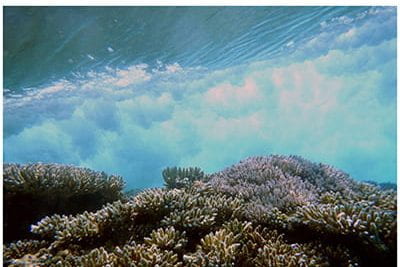
Report provides guide to funding for coral reef restoration projects for risk reduction
UC Santa Cruz played a leading role in a multi-agency group working for the U.S. Coral Reef Task Force to provide guidance on the development of coral reef restoration proposals for federal hazard mitigation funding.
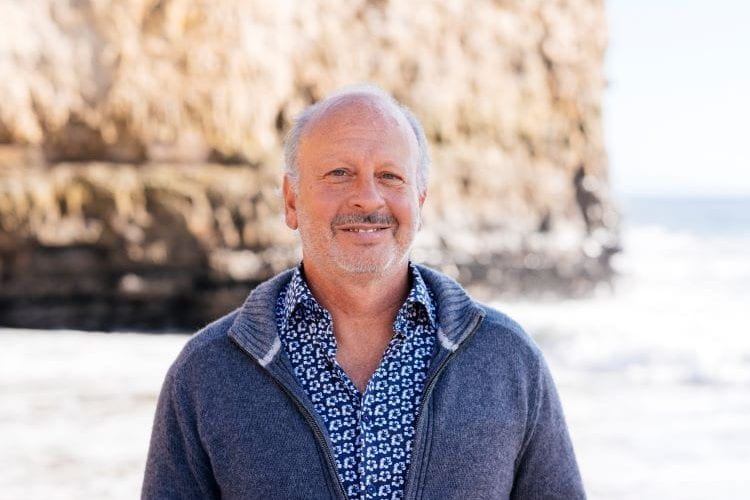
UCSC marine sciences professor to lead new Center for Coastal Climate Resilience
Longtime UC Santa Cruz marine sciences professor Michael W. Beck was named as director of the campus’ Center for Coastal Climate Resilience.
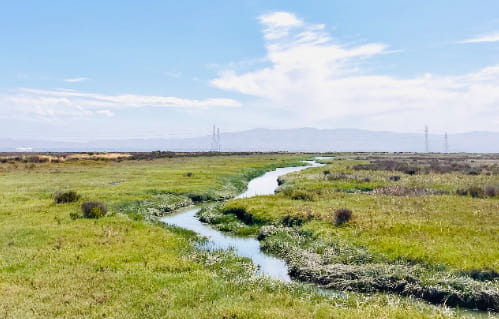
UC Santa Cruz researchers value salt marsh restoration as a crucial tool in flood risk reduction and climate resilience in the San Francisco Bay
Salt marsh restoration can mitigate flood risk and bolster community resilience to climate change in our local waterways, according to a study published in Nature.

UCSC’s Center for Coastal Climate Resilience awards over $4.6 million to support California coastal projects
The Center awarded over $4.6 million in funding to 23 UC Santa Cruz research groups for pilot and implementation projects.
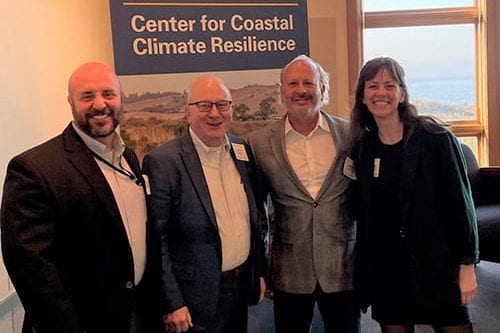
Scientists, policy leaders, and insurance experts meet to address climate risks
The Coastal Climate Resilience Symposium held at the Seymour Center focused on integrating nature-based solutions into risk management and insurance.
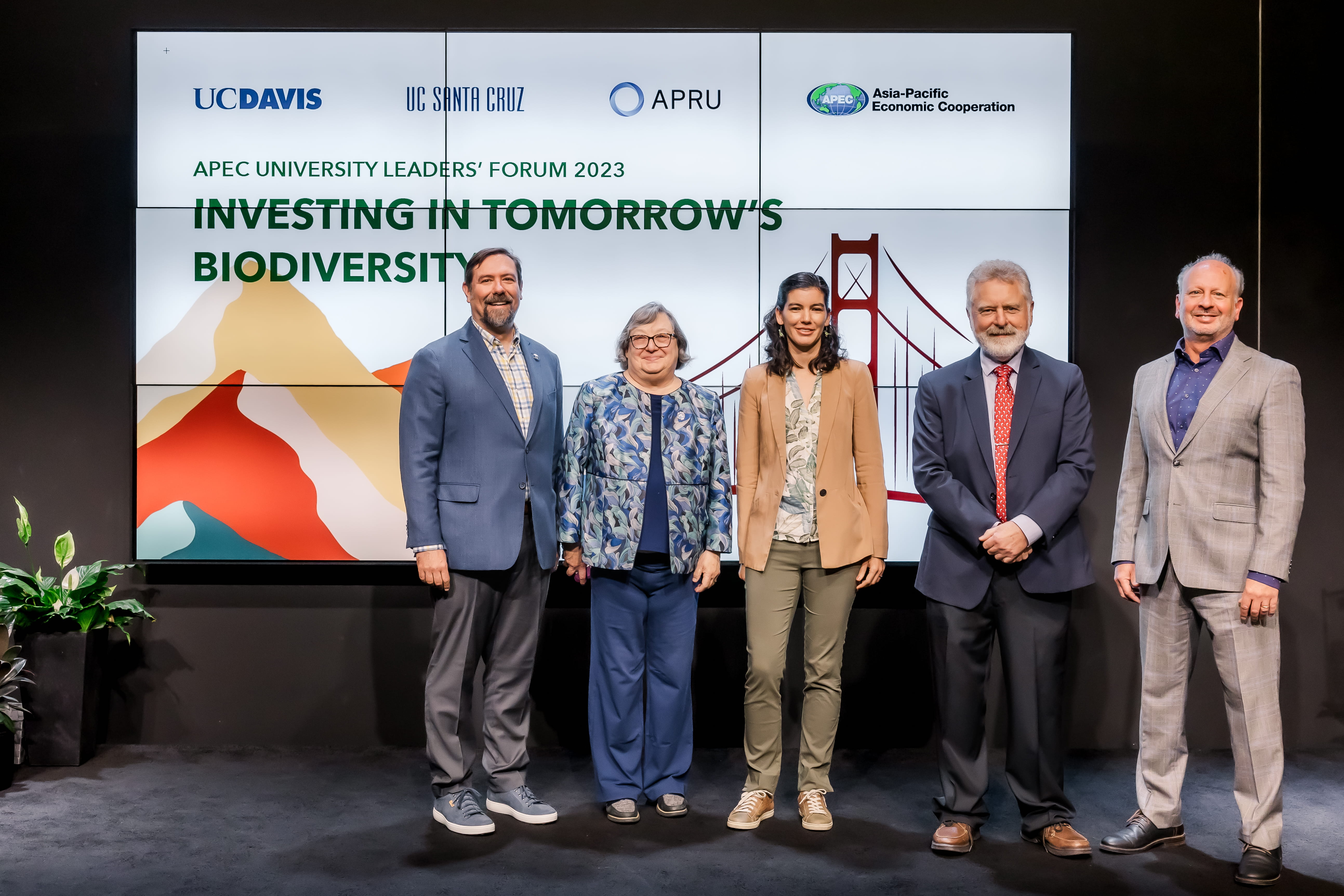
Worldwide leaders convene to protect, advance global biodiversity
UC Santa Cruz hosted the APEC University Leaders’ Forum with UC Davis and the Association of Pacific Rim Universities.
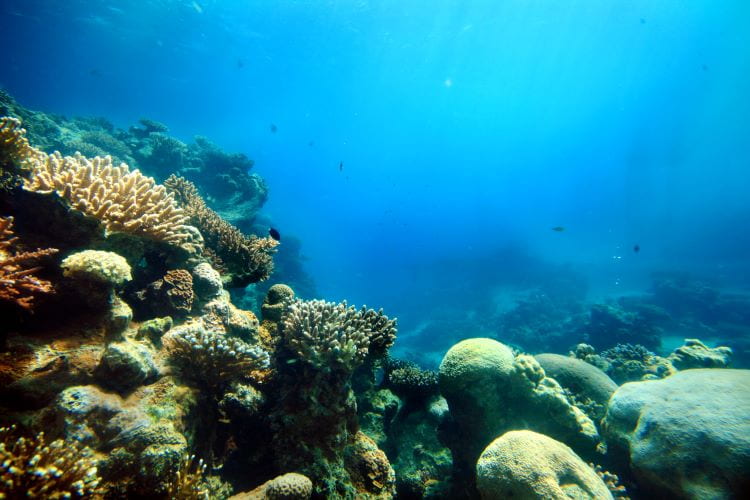
Coral reefs identified as national natural infrastructure
The U.S. Coral Reef Task Force (USCRTF) approved a resolution that designates coral reefs along U.S. states and territories as national infrastructure.
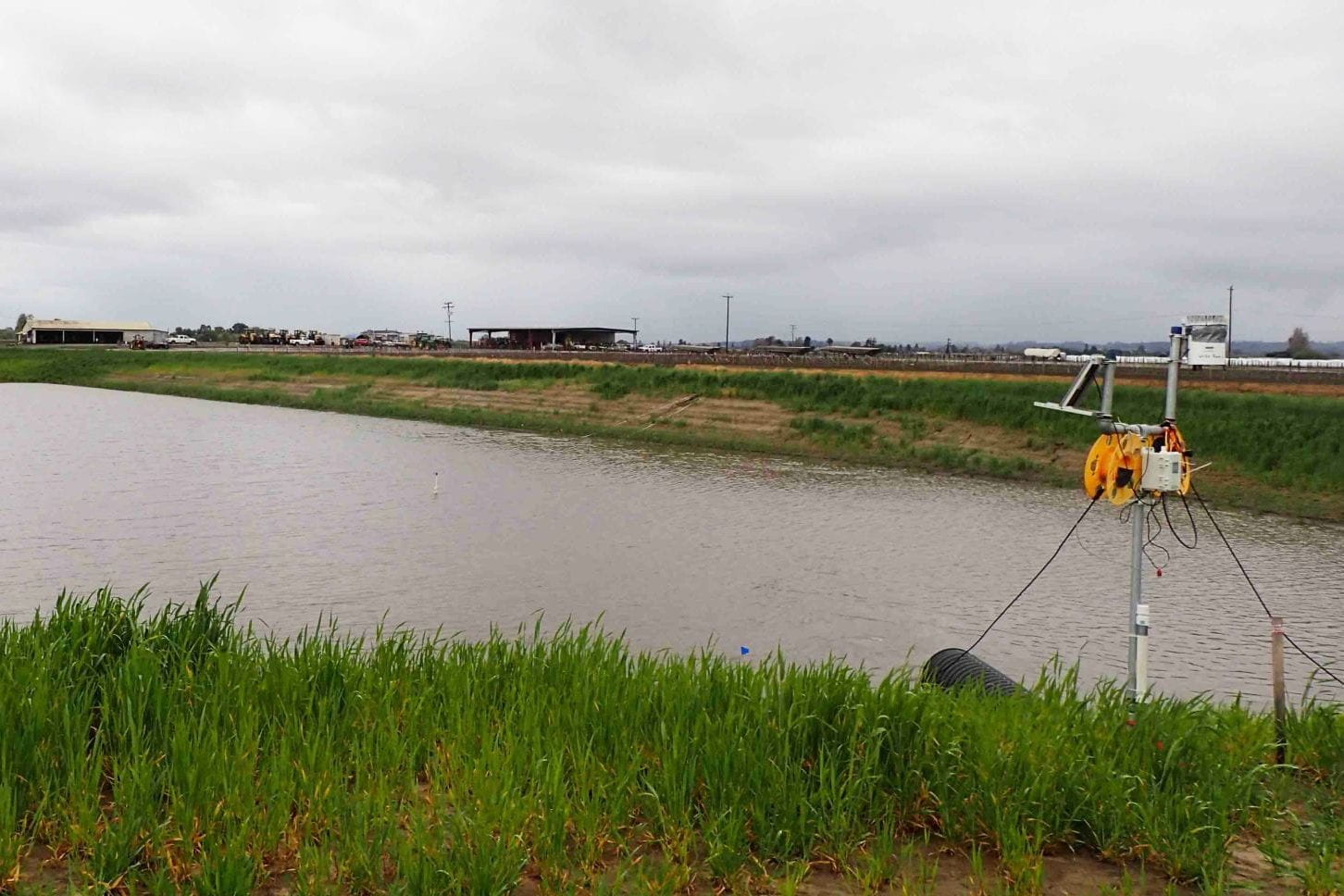
Rebates can offer solutions to California’s groundwater woes
A study by UC Santa Cruz and UC Berkeley researchers calculates how a program modeled after rooftop solar metering can enhance the storage of groundwater.